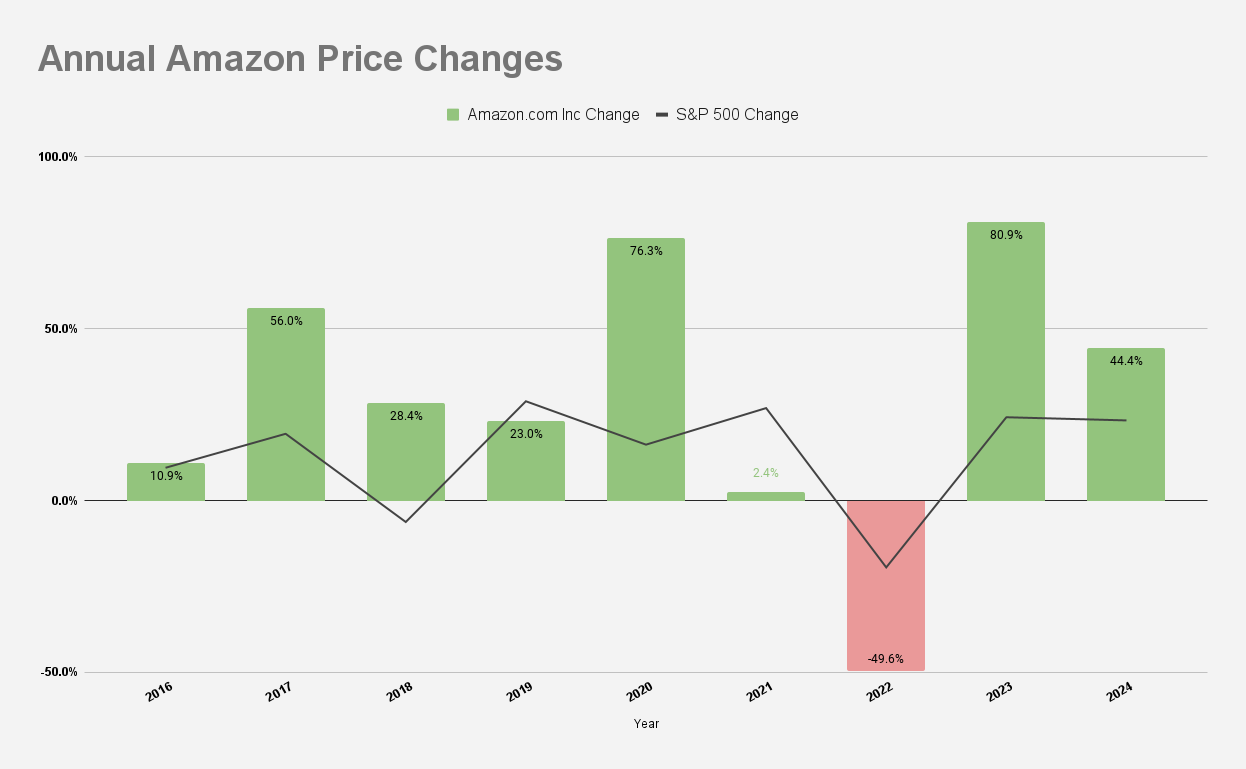Could Amazon stock be the key to your financial future? Check out why this company might be a cornerstone in your portfolio.
E-commerce pioneer Amazon (AMZN 1.80%) stock has been a roller-coaster ride in recent years. Share prices soared more than 50% in three of the last eight years, mixed in with a 50% drop in 2022. The company soared amid the golden e-commerce era of coronavirus lockdowns, but came back to earth with a bang when the world got back to work and made Amazon’s shipping network upgrade look frivolous.
Against that mottled backdrop, last year’s 44% price gain almost looks calm:
Data collected from Google Finance. Chart by author.
But that’s all history at this point. On Jan. 3, 2025, Amazon sports a $2.35 trillion market cap, and investors want to know where it can go from here.
Amazon’s solid foundation and new ideas
In some ways, Amazon looks ready to continue doing business as usual. The shipping infrastructure is growing again after a correction in 2023.
The Black Friday and Cyber Monday shopping events broke records with a 10% year-over-year sales jump. The Amazon Web Services (AWS) cloud computing platform has an annualized revenue run rate of $110 billion and generates about 60% of Amazon’s operating profits nowadays. International sales are growing faster than the domestic retail segment, indicating a healthy global expansion.
At the same time, this habitual innovator keeps coming up with new business ideas. For example, Amazon’s machine learning and artificial intelligence (AI) features are growing sales much faster than the AWS system ever did. Clients can buy computing time with high-performance Nvidia chips or save money with Amazon’s proprietary AI accelerators. The company’s pharmacy services will reach more than half of the U.S. population in 2025, stealing market share in an industry where more than 90% of prescriptions are served by physical stores.
Expect the unexpected
Here’s Amazon’s most important quality. The company keeps surprising me, and I love it.
- AWS looked like a hobby at first but has grown into a gigantic business.
- One-day shipping services never struck me as a profitable idea, but Amazon proved me wrong and followed up with same-day deliveries.
- The Whole Foods Market buyout came out of the blue in 2017. By now, Amazon has integrated the upscale grocery chain into its shipping systems. The related online food shopping service recently expanded from nonperishables to fresh stuff such as eggs and milk.
- Don’t forget that this global business empire started as a small bookstore business with big dreams. Everything outside that core business may have seemed silly at first, but Amazon’s out-of-the-box thinking often brings robust financial results.
From an investor’s perspective, this flexibility is the best thing about Amazon. Management may not get every decision right, and the road to long-term growth is always full of potholes. But Amazon knows how to adapt to changing times, often leading the broader market from the front.
I can’t wait to see what Amazon comes up with next, and how unheard-of ideas might set the company up for many decades of future success.
Investing in Amazon for the long haul
Some stocks deliver quick price spikes but fade away in the long run. Others can deliver robust yet modest results for ages. Amazon strikes a thrilling balance between these extremes, combining strong growth prospects with the promise of sticking around for the long haul.
This is one of the very few stocks I could stick in a retirement portfolio and leave untouched forever. Mind you, I still prefer a properly diversified stock portfolio with a generous helping of market-tracking index funds, but Amazon is one of those rare high-quality stocks you can build a strategy around.
In other words, I do expect this stock to match or beat the broader market for decades. I can’t guarantee that any single stock will set you up for life — but Amazon comes close. If nothing else, this stock deserves your consideration as part of a complete Wall Street breakfast.
John Mackey, former CEO of Whole Foods Market, an Amazon subsidiary, is a member of The Motley Fool’s board of directors. Suzanne Frey, an executive at Alphabet, is a member of The Motley Fool’s board of directors. Anders Bylund has positions in Alphabet, Amazon, and Nvidia. The Motley Fool has positions in and recommends Alphabet, Amazon, and Nvidia. The Motley Fool has a disclosure policy.

